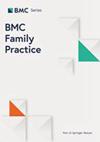全科护士对实施痴呆症护理最佳实践建议的障碍和促进因素的看法--定性访谈研究
IF 3.2
3区 医学
Q1 MEDICINE, GENERAL & INTERNAL
引用次数: 0
摘要
随着人口老龄化和痴呆症患者人数的不断增加,全科医生对最佳痴呆症护理的需求也随之增加。我们有机会更好地利用护士在初级医疗团队中的作用,以满足在为痴呆症患者提供护理方面日益增长的需求。然而,全科护士在为痴呆症患者及其照护者提供最佳实践护理方面的知识有限。澳大利亚临床实践指南》(Australian Clinical Practice Guidelines)和《痴呆症患者护理原则》(Principles of Care for People with Dementia)中包含的一些痴呆症护理最佳实践建议被认为与全科护士的职责高度相关。探讨全科护士对已发布的与其角色相关的痴呆症护理最佳实践建议的看法,并找出将这些建议落实到临床实践中的障碍和促进因素。13名澳大利亚全科护士参加了此次定性访谈研究。本研究的问题是在社会建构主义的范式框架内解决的。对数据进行了逐字记录和主题分析。全科护士高度认同这些建议的重要性,认为这些建议反映了痴呆症护理的最佳实践,并与他们的职责相关。然而,由于建议过于模糊且缺乏指导性,护士们认为建议对其临床实践的作用有限。研究确定了四大主题,分别描述了实施痴呆症护理最佳实践的障碍和促进因素:创造舒适的环境;改变护理方法;优化全科护士的角色和协同工作。九个次主题分别是:物理环境;社会环境;护理的复杂性;家庭护理规划;专业角色和身份;资助更好的痴呆症护理;教育、网络和资源;不同的角色,一个团队;以及机构间沟通。本研究发现了一些需要解决的因素,以支持全科护士将痴呆症护理的最佳实践建议融入到日常临床实践中。在制定干预措施时,需要包括一些策略,以减少潜在的障碍,并加强他们认为影响其为痴呆症患者及其照护者提供最佳实践护理的促进因素。本研究中获得的知识可用于制定多方面的干预措施,这些措施以理论实施变革模型为依据,使全科护士能够将痴呆症护理最佳实践建议付诸实施。本文章由计算机程序翻译,如有差异,请以英文原文为准。
General practice nurse perceptions of barriers and facilitators to implementation of best-practice dementia care recommendations—a qualitative interview study
With an aging population and a growing prevalence of people living with dementia, the demand for best-practice dementia care in general practice increases. There is an opportunity to better utilise the nurse role within the primary care team to meet this increasing demand in the provision of care for people living with dementia. However, general practice nurses have limited knowledge in the provision of best-practice care for people living with dementia and their carer(s). A number of best-practice dementia care recommendations contained in the Australian Clinical Practice Guidelines and Principles of Care for People with Dementia have been identified as highly relevant to the role of the general practice nurse. To explore general practice nurses’ perspectives on published best-practice dementia care recommendations relevant to their role and identify barriers and facilitators to their implementation into clinical practice. Thirteen Australian general practice nurses took part in this qualitative interview study. The research questions for this study were addressed within a paradigmatic framework of social constructionism. Data were transcribed verbatim and thematically analysed. There was a high level of agreement between general practice nurses that the recommendations were important, reflected best-practice dementia care and were relevant to their role. However the recommendations were perceived as limited in their usefulness to nurses’ clinical practice due to being too vague and lacking direction. Four main themes were identified describing barriers and facilitators to operationalising best-practice dementia care.: creating a comfortable environment; changing approach to care; optimising the general practice nurse role and working collaboratively. Nine sub-themes were described: physical environment; social environment; complexity of care; care planning for the family; professional role and identity, funding better dementia care, education, networking and resources; different roles, one team; and interagency communication. This study identified several factors that need addressing to support general practice nurses to integrate best-practice dementia care recommendations into daily clinical practice. The development of interventions needs to include strategies to mitigate potential barriers and enhance facilitators that they perceive impact on their delivery of best-practice care for people living with dementia and their carer(s). The knowledge gained in this study could be used to develop multi-faceted interventions informed by theoretical implementation change models to enable the general practice nurse to operationalise best-practice dementia care recommendations.
求助全文
通过发布文献求助,成功后即可免费获取论文全文。
去求助
来源期刊

BMC Family Practice
医学-医学:内科
CiteScore
3.20
自引率
0.00%
发文量
0
审稿时长
4-8 weeks
期刊介绍:
BMC Family Practice is an open access, peer-reviewed journal that considers articles on all aspects of primary health care research. The journal has a special focus on clinical decision making and management, continuing professional education, service utilization, needs and demand, and the organization and delivery of primary care and care in the community.
 求助内容:
求助内容: 应助结果提醒方式:
应助结果提醒方式:


